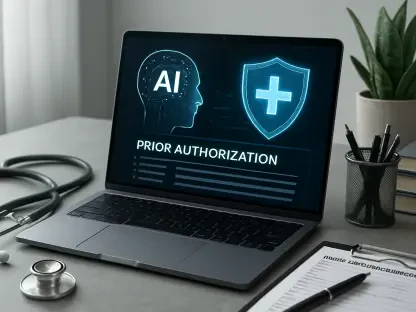The rise of Artificial Intelligence (AI) technology is creating a paradigm shift across various sectors, from social work to healthcare, each benefiting uniquely from these advancements. As AI tools and systems emerge, they enhance efficiency, reduce operational costs, and refine outcomes by automating routine tasks and improving complex processes. This wide-ranging technology is not just a futuristic concept but a present-day reality, revolutionizing the ways in which industries operate.
AI in Social Work
Magic Notes: Revolutionizing Administrative Tasks
In social work, the ‘Magic Notes’ AI tool is designed to create instant summaries, suggest follow-up actions, and draft letters, ultimately reorienting the social worker’s focus towards client care rather than administrative tasks. By automating these laborious duties, ‘Magic Notes’ helps free up valuable time and resources. This technology has already been adopted by three councils, and its usage is expected to expand, demonstrating its efficacy. The potential annual savings from these efficiencies could reach £2 billion, according to estimates, through significant reduction of time spent on what are deemed ‘menial’ tasks.
The real impact of this technology becomes clear when considering the number of cases a social worker handles daily. With fewer administrative hurdles, social workers can provide more direct support and timely interventions. This not only helps in improving outcomes for clients but also reduces burnout among social workers. The integration of ‘Magic Notes’ and similar AI tools symbolizes the beginning of a technological transformation in social services, fostering a shift towards more client-centered approaches without sacrificing administrative accuracy.
AI in Retail
Self-Checkout Innovation
The retail sector has witnessed significant changes thanks to AI’s integration, particularly in the form of AI-powered self-checkout kiosks in large supermarket chains such as Sainsbury’s, M&S, and Aldi. These advanced kiosks employ sensors and cameras to monitor items being purchased, thereby reducing scanning errors and thwarting theft attempts. The efficiency gained from this technology helps cut down on employee overhead costs while speeding up the checkout process, making it more seamless for customers.
By automating these processes, retailers can allocate human resources to more critical areas where personal interaction and complex decision-making are required. This technology also enables stores to analyze consumer behavior patterns, providing valuable insights for future planning and inventory management. As retailers continue to adopt AI-based solutions, the industry stands to gain in both operational efficiency and enhanced customer experience.
AI in Education
Alleviating Teacher Workloads
In education, the UK government has pioneered a £4 million initiative to support teachers through AI-curated teaching materials. This plan aims to alleviate the considerable administrative burdens that teachers face, allowing them to focus on more impactful educational activities. AI tools like ‘Turnitin’ also play a crucial role in academic integrity by detecting plagiarism and even identifying AI-generated content in student assignments, ensuring a fair and honest academic environment.
By integrating AI into the education system, teachers can save time on routine tasks such as grading and material preparation, shifting their focus towards personalizing learning experiences for students. This technological shift represents a significant leap towards a future where teachers can better address the diverse needs of their classrooms, providing individualized support and fostering a more engaging learning environment for all students.
AI Tools in Higher Education
AI’s application in education is not confined to primary and secondary schools; it also extends to higher education establishments. Universities employ AI tools not only to detect plagiarism but also to personalize learning experiences through data analysis. For instance, AI can track a student’s progress and identify areas where they might need additional help. This proactive approach can dramatically improve academic outcomes, as it ensures timely interventions are made to address student needs.
Moreover, the utilization of AI in administrative functions, such as managing course registrations and handling student inquiries through chatbots, further embodies the transformative potential of AI in education. By automating these processes, educational institutions can optimize their resources and provide better services to students, ultimately fostering an enriched learning environment.
AI in Manufacturing
Enhancing Efficiency in Production
Manufacturing titans like Rolls-Royce and Siemens have harnessed AI technology to significantly enhance production efficiencies. Rolls-Royce utilizes AI for monitoring and diagnostics of engine performance, which allows for predictive maintenance and reduces downtime. Such advanced monitoring capabilities ensure that engines operate at peak performance levels, thereby extending their operational life and reducing unscheduled maintenance costs.
Siemens employs AI to automate its production lines and monitor equipment, ensuring smooth and efficient manufacturing processes. The use of AI in these contexts not only boosts productivity but also improves the precision and quality of the manufactured products. By incorporating AI-driven systems, manufacturing giants can achieve greater scalability and flexibility, while maintaining stringent quality standards.
Ethical and Trustworthy AI Usage
Ethical considerations are paramount as AI becomes integral to manufacturing processes. Rolls-Royce’s development of the ‘Aletheia Framework’ exemplifies a commitment to ethical and trustworthy AI use. This framework seeks to ensure that AI deployments are conducted with transparency, fairness, and accountability, addressing concerns about biases and ethical implications that may arise from AI applications.
By adhering to such ethical frameworks, the manufacturing sector not only enhances its operational capabilities but also builds trust with stakeholders. This dual focus on efficiency and ethics sets a precedent for the responsible integration of AI, demonstrating that technological advancements can go hand-in-hand with corporate responsibility.
AI in Healthcare
Advancing Medical Imaging and Disease Screening
In healthcare, the NHS AI Lab has been instrumental in addressing the barriers to AI system development and deployment. AI tools in this sector significantly aid imaging and screening processes for diseases such as cancer. For instance, ‘Mia IQ’ is an AI system used for breast cancer screenings, while other AI tools assist in analyzing CT scans for undiagnosed spinal fractures. These advances not only enhance diagnostic accuracy but also expedite the detection and treatment of critical health conditions.
AI’s role in healthcare transcends diagnostics, influencing patient management and administrative functions as well. By automating routine tasks such as appointment scheduling and patient record management, healthcare providers can focus more on patient care and less on administrative burdens. This shift ensures that valuable medical expertise is utilized where it matters most, significantly improving patient outcomes.
Ensuring Compliance and Patient Guidance
The advent of AI technology is ushering in a fundamental change across various industries, spanning from social work to healthcare, with each sector reaping specific benefits from these technological advancements. AI tools and systems are transforming how we operate by boosting efficiency, lowering operational costs, and enhancing outcomes through the automation of routine tasks and the optimization of more complex processes.
In healthcare, AI assists in diagnosing diseases, predicting patient outcomes, and personalizing treatment plans, significantly improving patient care. Social work, on the other hand, benefits from AI’s ability to analyze data trends, providing insights that help social workers make more informed decisions. This broad-spectrum technology is far from being a mere futuristic concept; it’s a tangible reality that is drastically altering how industries function today. As AI continues to evolve, its potential to revolutionize our everyday processes and professional practices only grows, promising even more profound impacts in the future.









